Project Zero 3: The Tormented Review
Project Zero 3: The Tormented
No game series does scary quite like Project Zero. Stuart Andrews peers nervously through his fingers at the final installment.

Verdict
Key Specifications
- Review Price: £25.00
”’Platform: PS2”’
I’m not really sure that I should recommend this game, and I’ll tell you why. Last Sunday night, I made the mistake of sneaking a game in before I went to bed. As a direct result, I woke up bleary-eyed and shattered on Monday morning, having hardly slept a wink. Fittingly, for a game that takes place mostly in the dark dreams of its central characters, The Tormented gave me the worst nightmares I’ve had in years.
You see, there are plenty of scary games out there, running back from the days of Alone in the Dark right through to the ferocious assault of Resident Evil 4, but with the exception of Silent Hills 1-3, I can’t think of anything as creepy as the Project Zero series. The first was often dismissed as an oddity – who had heard of anything as silly as a survival horror game where you dispatched ghosts with the aid of a mystic camera? But those of us who persisted with it saw it as a blueprint for greatness to come; a game series that took the themes and styles of the burgeoning Japanese horror cinema and used them to frighten the stuffing out of you. That promise was confirmed by the sequel, Crimson Butterfly, which expanded the setting from a haunted house to a village of the damned, throwing in a doom-filled plot with a surprising emotional punch. The third and, we’re told, final part of the trilogy is if anything darker and scarier still. Which is why, after last Sunday night, I’m only playing it in the mornings with the daylight creeping through the curtains.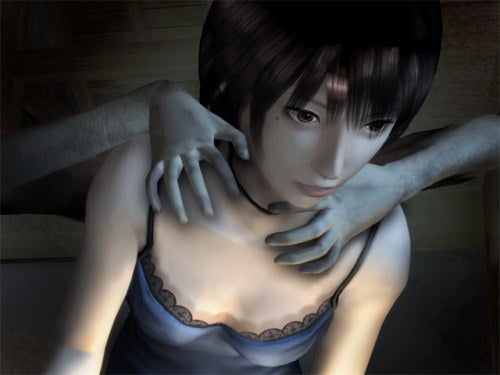
This time, the premise has changed slightly. Project Zero has always taken place in a grey zone between reality and dark fantasy, but this is the first where the action explicitly takes place in the protagonist’s dreams. Having lost her boyfriend in a car crash, photographer Rei Kurosawa spends her nights in a recurring nightmare, where she wanders the rooms and corridors of a ghostly mansion, seemingly peopled by the restless spirits of guilt-ridden survivors of similar accidents. Each night, she explores new areas, solving puzzles, unlocking the house’s secrets, and fending off hostile apparitions with the aid of the infamous camera. Each day, she tries to unravel what she saw and learnt the night before, with the aid of a plucky assistant, Miku, and the exposed film she finds in the mysterious old camera on her desk.
At first, this separation between the night’s exploration and the day’s investigation offers some relief to the beleaguered Project Zero player – after all, there are only so many close encounters with creepy dark haired women floating towards you with talons outstretched hissing “I won’t let you leave” that the average heart can take in one stretch. After a while, however, the line starts to blur. The weird static effect that you see in dreams starts turning up in daylight hours; visions start appearing in your living room; a hospital visit goes horribly awry, and – worst of all – a painful tattoo spreads out from your shoulder every morning, a little further each day, before disappearing. The implication is clear – either Rei sorts out the house in your dreams, or one day she’ll become a permanent resident. 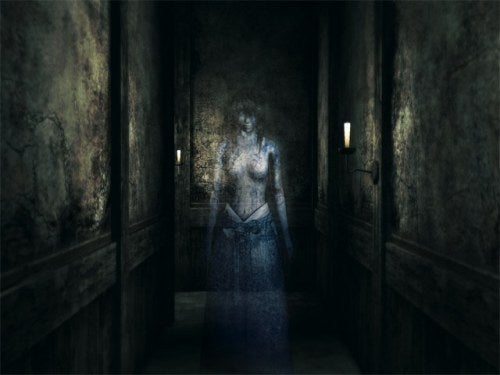
The decision to return from Crimson Butterfly’s haunted village to a single mansion might seem like a bizarre step backwards but, with a few reservations I’ll come to later, it makes perfect sense, enabling the developers to create a more focused mood piece where the return to specific areas brings a dreadful resonance each time. Plus, there’s always a feeling that the mansion has more horrors to unveil; more secret, fearful chambers to discover – provided you survive long enough to see them.
The resulting atmosphere is electric, in the worst possible way. As always with Project Zero, a lot of it is the audio – full of gloomy ambient music and weird, untraceable noise – while some of it is the use of fixed camera angles which retard your knowledge of your surroundings while always hinting that something nasty is lurking in the shadows. In truth, this can make the game feel old fashioned, particularly in the wake of Resident Evil 4, but you can’t deny that it works… frequently too well for comfort.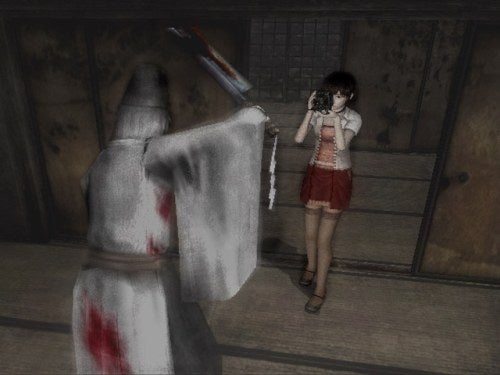
Simply put, Project Zero has always pushed the fear factor on three levels. Firstly, the aforementioned sense that something is waiting for you in the next room or the dark corner. Secondly, in its sudden visions, voice recordings and scattered notes, there is always the impression that something hideous is going on, and that whatever it is will only get worse the closer you get to the bottom of it. Thirdly, the ghosts themselves are always bloody creepy. It might just be me, but the drifting wraiths and fast-moving ethereal psychos of The Tormented seem a thousand times worse than Doom 3’s demons or the gross-out bio-horrors of Resident Evil. True, the shambling forms of Silent Hill are a closer match – and don’t even get me started on Pyramid Head – but every time The Tormented lets another spirit loose, I find myself squeaking at the TV like a neurotic mouse from Bagpuss with Tourettes. This is another reason why I stopped playing it late at night when others in the house are trying to sleep.
And just when you think it can’t get worse, it does, with the introduction of two new playable characters: your female assistant, Miku and a male writer, Kei. Both have additional capabilities – Miku can fit in smaller spaces and develops a handy slow-down power, Kei can use brute force to remove barriers the other can not – but both also have their weaknesses. Miku is a) frail and b) no use with the camera at long range. Kei, meanwhile, is initially defenceless against the ghosts and must find a safe place to use his special hide move when they appear. Hiding, defenceless, while the ghosts try to seek you out did not, needless to say, settle my nerves one bit.
What keeps you going is the fascinating story and structure. You want to get further in the story, you want to finally lay the mystery to rest. In addition, there’s a real sense that The Tormented completes the Project Zero story. Miku was the heroine of the first game, and her lost brother Mafuyu has his part to play here as well. Kei, meanwhile, is the uncle of Mio and Maya from Crimson Butterfly, pulling that strand of the story in to boot. 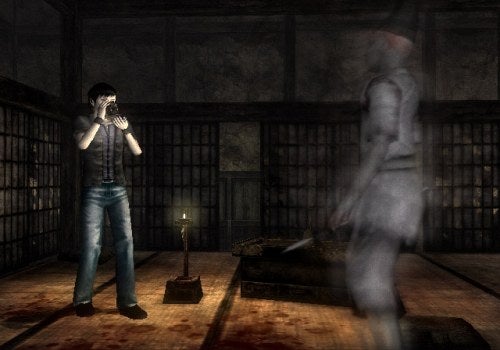
However, there are some things that might tempt you occasionally to give up. Firstly, the difficulty level seems higher than part two – unless you have the good sense to play through on Easy first time around – with the game throwing in the more annoying shifting and teleporting ghosts very early on in the proceedings, and demanding some camera skills right from the off. As the aiming and targeting system has always been hard work, with your character taking far too long to turn, this is hardly the easiest thing in the world. Secondly, there is more of a sense of repetition, with certain areas of the house losing their terror once you’ve seen them with each character several times – though occasionally the game might use this to throw you off balance all over again. And why throw in random ghosts once the game passes its halfway stage? It’s hard enough getting back to a save point after an encounter, without some wandering spirit killing you off before you get there.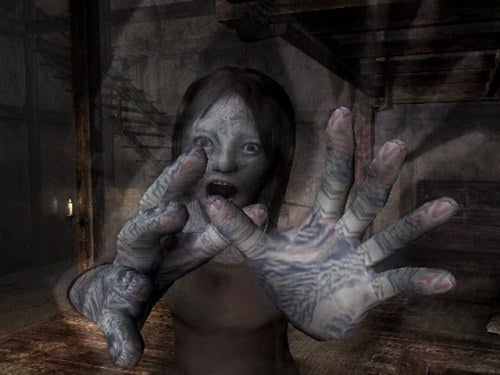
And it’s these factors that make me add that The Tormented isn’t the best introduction to the series – for that I’d forget part one and go straight to Crimson Butterfly. In fact, overall it’s not quite as brilliant, varied or deeply memorable a game as its predecessor. However, there’s something about its sombre tone and concentrated dread that makes it an absolute must for anyone who enjoyed that game. If you haven’t and consider yourself a horror fan, stop reading now and get shopping – both games deserve some of your precious time.
”’Verdict”’
A fantastic, genuinely scary horror game, and a worth sequel to the mighty Crimson Butterfly. If it loses out with some over-tricky or repetitive gameplay, it triumphs in terms of brooding atmosphere.

